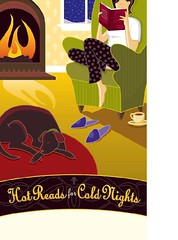Lately I’ve been part of a variety of conversations that, in essence, question the value of participation in all things library 2.0. The talk ranges from “I have no use for 2.0 technologies” to “I have no use for anyone else who does use 2.0 technologies.” While I am a professed technology junky, limited only by hours in the day to try everything I’d like and $$$ in my bank account to buy the toys I’d like, I don’t fit in the category that has no use for anyone who doesn’t share my interests. However, I have serious concerns for those who will not acquire any 2.0 knowledge or skills.
I’ve heard a great many excuses for not developing a 2.0 familiarity: I have no use for a blog; It’s a waste of time; I’m retiring soon; My community doesn’t want a technology centered library; A particular staff member takes care of all the computers; I didn’t become a librarian to run computers; It’s a fad that will go away, just like all the rest of them.
I suggest that there are at least 3 reasons why library information professionals should make the effort and the time to develop familiarity and skills with at least a representative few interactive, communicative technology tools.
- Using 2.0 technologies stretches budget and outreach. Most of the tools are available as open source, free-ware, or at really low cost (you can’t beat $24.95 a year for a Flickr account.) With minimal investment of time reading help screens or using tutorials (especially on WebJunction) or even attending one of our classes and time practicing, a librarian can put together a website or an online newsletter with blog software – and postage cost is $0. Pictures posted on Flickr thrill most everybody – a lot of us still haven’t gotten over the ego trip of seeing our picture published.
- Developing 2.0 tools produces training opportunities and models. I may develop a blog or podcast that is of value to very few if any people. However, in doing so, I’m acquiring skills that I can relate to someone else who has a need to develop that tool. I can also use the tool I created as a model or demonstration project. With some experience, I may adapt the tool in a useful way to promote my library.
- Be in the know. The librarian is the town “smart” person. Where else can the average citizen go to get baffling questions answered — and nothing is more baffling than technology. By positioning oneself as the go-to expert on everything from how to get that picture out of the e-mail to how to understand and even take a look at MySpace, where one’s kid is seemingly spending a lot of time, the librarian can be established as a trusted information source. While working with one of our public libraries on strategic planning, I was impressed by the committee’s sincere desire to endow the library with a goal of being a leader in cutting edge technology.
.


